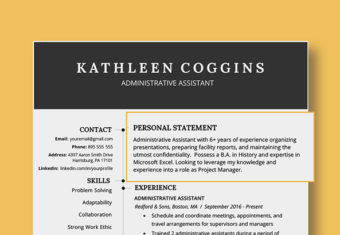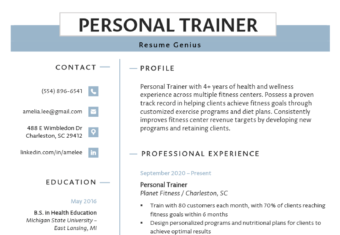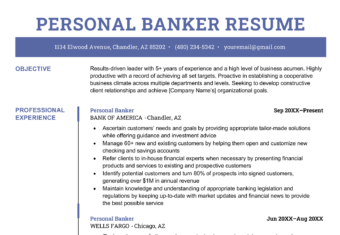What is a personal mission statement?
A personal mission statement is a short statement (usually 1–2 sentences) that describes who you are, what your life’s overarching goal is, and how you’re going to achieve it. Here’s an example of an inspiring personal mission statement:
“To be a lifelong learner, always seeking new knowledge and experiences and embracing calculated risks and uncertainty as opportunities to grow as a person.”
Also known as a personal vision statement or personal purpose statement, a personal mission statement is primarily for yourself. As a reminder of your life’s purpose, it’ll help you make decisions, such as:
- what career(s) do I want to pursue?
- what should I do with my free time?
- what responsibilities should I take on at work?
- what relationships should I build, maintain, or avoid?
- what skills should I work on?
Examples of personal mission statements
Whether you’re a student, already established in your career, or a leader in your field, draw inspiration from these personal mission statement examples.
“Embrace something bigger than yourself. Continually improve your skills. Inspire others to achieve great things and make the world a better place. This is how the quiet humble person leaves their mark.”
— Jeffrey Madden, Senior VP and Portfolio Manager at RMB Capital
“If something is important enough you should try, even if the probable outcome is failure.”
— Elon Musk, Tesla
“To help people find hope after loss.”
— Gloria Horsley, Open to Hope
“To be a physician working in poverty-stricken areas where I can share my passion for health and wellness.”
“Lead by encouraging creative thinking necessary for innovative solutions.”
“Use my imagination and graphic design skills to engage consumers.”
“Promote safety, well-being, and self-confidence for children and young adults as a mental health counselor.”
“Develop life-saving technologies using my bioengineering expertise, determination, and critical thinking skills.”
“May I be a reservoir for your concern and pain, and may my training and humanity interpret and understand your need.”
— anonymous medical student
“May I never forget, no matter how frustrated I may be at the time, that each patient is someone’s mother/father, sister/brother, son/daughter.”
— anonymous medical student
“Allow me to remain in awe of the wonders of the human mind, body, and soul.”
— anonymous medical student
“To develop a well-rounded skill set, embracing challenges and using failure as a tool for growth and self-discovery.”
“To serve as a leader, live a balanced life, and apply ethical principles to make a significant difference.”
— Denise Morrison, Campbell Soup Company
“To be a teacher. And to be known for inspiring my students to be more than they thought they could be.”
— Oprah Winfrey, OWN
“I want to make it so that every person in the world can afford to start their own business.”
— John Rampton, Hostt.com
“I want to serve the people. And I want every girl, every child to be educated.”
— Malala Yousafzai, Nobel Prize laureate and activist
“To be such a good leader that my services are no longer required.”
“My mission in life is not merely to survive, but to thrive; and to do so with some passion, some compassion, some humor, and some style.”
— Maya Angelou, author
“To inhale every sunrise, and look under every rock for the joy life has to offer.”
— woman who works in a cancer care center
“Improve lives. The concept of improving lives runs through the center of everything I do.”
— Will Smith, actor
“To constantly be striving to be the best version of myself — in my job, with my health and fitness, with my relationships with family and friends, and with my emotional well-being.”
— Katie Arnold, author (Talk Less, Say More)
“To have fun in my journey through life and learn from my mistakes.”
— Richard Branson, The Virgin Group
How to write a personal mission statement
Writing a personal mission statement can be intimidating, whether you’re unsure what your life’s mission is or you have so many interests and goals you don’t know which are the most important. To make the process easier for you, we break down how to write a personal mission statement into 5 steps:
Developing your personal mission statement could take days, months, or even years. Also your personal mission statement will change over time as you gain life experience.
1. Identify your unique characteristics
When writing your personal mission statement, start by brainstorming. The first step is to answer the question, “Who am I?”
We’re made up of what’s important to us. So ask yourself questions like the ones below to determine what’s important to you:
- What were you doing the last time you felt happy and fulfilled?
- What gets you excited (e.g., hobbies, aspects of your job, objects, more abstract concepts like social justice)?
- What are your strengths?
- What are your values?
Even if you don’t think you have special skills or traits, you know that nobody has had the same experiences as you. Think of how your skills and experiences combined can bring value to the world.
If you get stuck, consider the questions above from the perspective of those close to you or ask friends and family how they’d describe you.
2. Decide who to dedicate your life’s mission to
Next, answer the question, “Who do I want to live for?” Anybody or anything can be on the receiving end of your life’s mission, no matter how specific or general.
For example, you can dedicate your life’s mission to underprivileged children in the small neighborhood you grew up in or the redwood forests of North America — and it can even be yourself.
3. Determine your life goal
Your life goal connects who you are as a person to the population you want to help. As a result, your life goal should include action verbs to show what you want to accomplish (e.g., to lead my community, to save lives, to create art that inspires all people).
Some questions to help you brainstorm your life goal include:
- how do you want your life to look from the view of your multiple identities (e.g., child, parent, partner, employee, colleague, community member)?
- what do the various aspects of your life (physical, emotional, mental, spiritual) look like?
- what would you like your legacy to be?
- what are specific goals you’ve set in the past? Do they have a common theme?
- what are achievements you’re especially proud of?
4. Follow the personal mission statement template (or make your own)
Your brainstorming should give you the information you need to fill in this personal mission statement template:
To use [unique value or trait] to [action verb] [life goal or expected outcome] for [whomever or whatever]
Here’s an example of a famous personal mission statement that follows this format:
“To use my gifts of intelligence, charisma, and serial optimism to cultivate the self-worth and net-worth of women around the world.” – Amanda Steinberg, founder of Dailyworth.com
But don’t feel like you have to use a personal mission statement template. As long as you include the key components called for in the template, feel free to add your own style.
An example of an impactful personal mission statement that doesn’t follow a template is from Mahatma Gandhi:
“I shall not fear anyone on Earth. I shall fear only God. I shall not bear ill will toward anyone. I shall not submit to injustice from anyone. I shall conquer untruth by truth. And in resisting untruth, I shall put up with all suffering.”
5. Make sure it’s not too general or too specific
Your personal mission statement needs to be broad enough to help you with the variety of situations you’ll encounter over your life while being just specific enough to help you make decisions.
See the differences between an overly specific and overly general mission statement, and one that’s just right:
Overly specific mission statement
“To write a piece that wins a Pulitzer Prize.”
Overly general mission statement
“To enjoy life.”
Balanced mission statement
“To create thoroughly researched and engaging content to share with the masses, and to adapt the same high standards for my writing to every aspect of my life.”
If your mission statement is written too much like a specific goal, it may not be useful in other areas of your life, such as hobbies or relationships.
On the other hand, avoid making your personal mission statement too general. For example, if your mission statement is “to enjoy life” and you enjoy both journalism and chemistry, your mission statement won’t help you decide which of the two majors to pursue.
How to use your personal mission statement in your job search
In addition to helping you make decisions (and giving you hope on a bad day), personal mission statements are useful throughout all stages of your job search:
1. Add it into your resume introduction
You can easily rework your personal mission statement into a compelling resume summary when applying for a job.
Here’s an example of a personal mission statement:
To use my problem-solving skills, compassion, and determination to improve quality of life and health outcomes for cancer patients.
And this is a resume summary based on the personal mission statement above:
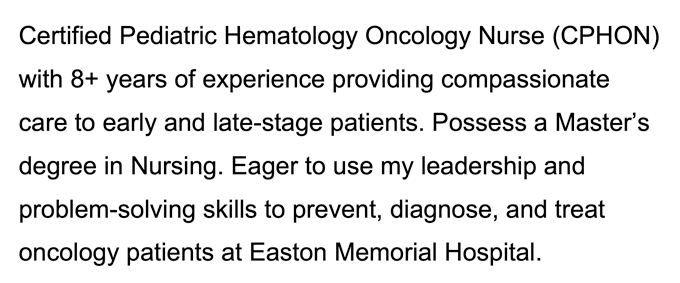
The job applicant turns their personal mission statement into an engaging resume introduction by adding their concrete qualifications (education and certification) and including details relevant to the specific job posting, such as the organization’s name and mission.
2. Work it into your cover letter
Hiring managers view the first paragraph as the most important part of your cover letter. So add elements of your personal mission statement into your cover letter’s first paragraph to ensure you grab the reader’s attention with your passion for your work.
See this example of a personal mission statement:
To use my critical thinking and strong interest in business strategy to bring consumers the products they need for more convenient, healthier lives
And how an applicant incorporates their personal mission statement into their cover letter:
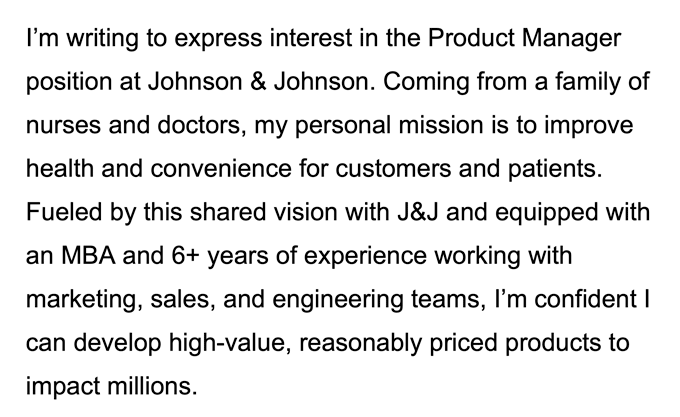
To write a concise but impactful cover letter introduction, the applicant brings up a qualification (MBA) that demonstrates the skills and interests they’ve included in their personal mission statement (critical thinking and business strategy).
3. Keep it in mind when interviewing
In interviews, employers want to get to know you personally. As a result, you’ll likely need to answer questions about why you want to work at a particular company or in a certain career.
A good way to answer these questions is to start by sharing your personal mission statement with the interviewers. Then, explain how your personal mission aligns with that of the company or with your career path.
Frequently asked questions about personal mission statements
Want more information about personal mission statements? Check out our answers to 3 personal mission statement questions to help you with your job search and career development.
1. Is a personal mission statement the same thing as a career mission statement?
A personal mission statement is not the same thing as a career mission statement. While a personal mission statement can be used to help you make career decisions, a personal mission statement can extend to both the personal and professional parts of your life.
2. How do I write my personal mission statement if I don’t know my life’s mission?
You don’t need to know your life’s mission before writing your personal mission statement. In fact, writing your personal mission statement can help you identify and refine your life’s purpose. The brainstorming process (identifying your qualities, goals, and the people you want to assist) will help you to better understand your mission. Even if you only have a vague idea of your life’s mission, you can write it down first and refine it over time.
3. What is a personal value statement?
A personal value statement is a document describing your skills, experience, and career goals. This type of statement is often a few paragraphs long and can either be sent with your resume when applying to specific jobs or posted on your social media (e.g., the About page of your LinkedIn profile).
A personal value statement is more similar to a cover letter than to a personal mission statement and is written to show hiring managers why you’d be a good fit for their role. But while a cover letter focuses more on your skills and experience, a personal value statement convinces hiring managers to consider you based on your personal values and long-term goals.
Click to rate this article
4.3 Average rating




